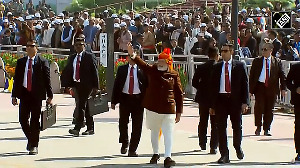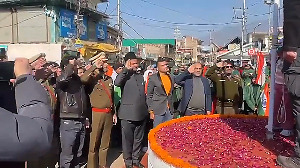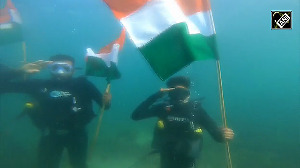Negotiations on Singapore issues, that have remained a taboo for India, will be the main discussion point at the World Trade Organisation ministerial meeting in Cancun next month.
Commerce ministry officials contended that the spotlight will be on investment, competition policy, trade facilitation and transparency in government procurement next month. "They will either be accepted or we will get another two year breather," said an official.
Though officials forecast a repeat of the last ministerial at Doha in 2001 where India managed to ward off pressure from developed countries like the European Union and Japan to get a two year breather.
Factoring in India's concerns on Singapore issues, the Doha Declaration said: "We agree that negotiations will take place after the Fifth Session of the Ministerial Conference on the basis of a decision to be taken, by explicit consensus, at that session on modalities of negotiations."
While the Qatari trade minister, the chairperson for the fourth ministerial, said that the explicit consensus will be on commencement of negotiations, EU and Japan have interpreted the declaration to mean that a decision to launch negotiations had been taken and the next ministerial will decide on the modalities.
"Immediately after Doha, there was larger agreement between developing countries on India's position. But in the last two years, the way EU and Japan have gone about explaining their point of view to other members, it appears that they have more support at the moment," said a trade expert.
"We can of course use the Qatari minister's statement as a fallback option but it is more of a classificatory statement without any legal standing," he added.
The government has stuck to its stand, but within the economy, opinion to the contrary has been gaining currency. Even some former commerce ministry bureaucrats are now veering to the view that negotiations on these issues are not such a bad idea, particularly trade facilitation and government procurement.
Officials point out that there is support to India's position from other developing countries and a group of 11 countries have also come together on opposing the Singapore issues. But members of the groups are known to withdraw support at the last moment, as was the case in Doha.
Trade experts point out that one of the members of the group is Malaysia which has been dwindling on the subject. They said that Malaysia had a major role to play on the issues coming to the fore at the Singapore ministerial meeting in December 1996.
Even last year Malaysia's posture indicated it was not against the proposal. They also said that apart from countries like India, Kenya and China not many WTO members opposed the wordings of the draft Cancun declaration circulated last month.
The experts also criticise India's stand, which they said was not proactive. "We have always believed that we will be able to keep the issues out of the multilateral system and have not factored in the other possibility," said an expert.
Many countries, including China, are said to have started bargaining to get some other sops in return for agreeing on some, if not all, the Singapore issues. China does not want to undertake fresh obligations on industrial tariffs and agriculture saying it is already burdened with commitments it undertook while acceding to the WTO in 2001.
Besides, China is not too much against inclusion of trade facilitation and government procurement, which it wants to use to push domestic reforms.
While officials also agree that much progress on subjects like agriculture and industrial tariffs is not expected at the Cancun ministerial they did not concede to India's isolation on Singapore issues. Trade experts, however, are growing sceptical about the support.
India is expected to send a 25-odd member official delegation to Cancun. While Commerce and Industry Minister Arun Jaitley will head the contingent, Minister of State SB Mukherjee, commerce secretary Dipak Chatterjee, additional secretary SN Menon, two joint secretaries and junior officials from the ministry will be part of the team.
Representatives from the ministry of small scale industry and departments of industrial policy and promotion will be part of the team to provide support on industrial tariff negotiations.
Agrculture ministry officials will also be part of the contingent and representatives from Assocham, CII and Ficci will complete the official delegation. Ministries and departments dealing with the services negotiations (like finance and law) will, however, not be on board.
Members of the Indian High Commission in Brussels, the United States and the Permanent Mission in Geneva will join the delegation in Cancun.
Non governmental organisation representatives from India are, however, going to outnumber the official delegation. On last count, some 44 NGOs, with many of them sending more than one delegation, were going to participate.






 © 2025
© 2025